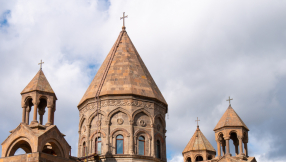Philip Yancey deserves a medal for consistently tackling the one issue that is perhaps the hardest to deal with in all of Christian thinking, and to keep dealing with it, again and again and again.
He does so always with the same sense of integrity and Biblical zeal that he's used to tackle issues of prayer and grace in much of his other writing.
In The Question That Never Goes Away, Yancey once again returns to the subject of suffering. In this book he seems to have two aims, to firstly confront the idea that the Bible has no specific answer to why so much suffering happens, and to explore how we as Christians are called to respond to suffering when it happens.
There is no question that the points he raises in the book are very important. For example, the atheistic critique of the Christian position on suffering is monumentally hollow. While Christians cannot provide a Biblical answer but are assured that God is still very much with us, atheists can only say to the grieving widower "this is how the universe is, what else did you expect?".
Similarly, it is important to remember that many of the people who shouted loudest and most angrily about God's seeming injustice in the face of evil are to be found in the Bible. Yancey helpfully reminds us that there are so many lamenting Psalms and so many desperate pleas and demands from the significant Israelite leaders, major and minor prophets, and even Jesus himself, that it can't be remotely considered unbiblical or somehow lacking in faith for Christians to be desperately wanting an answer.
He furthermore echoes and enhances Lewis's view that pain is a megaphone that God uses to shout to a deafened world, the ability of God to redeem even the seemingly darkest disasters to meaning of some kind - even if we ourselves do not live to see it - the unique ability of Jesus as a suffering God to empathise and relate to us in our troubles, and the vital point that if the Church is doing its job properly in being the helpers to those who are suffering, no one needs to ask where God is.
However, there is an unavoidable weakness to Yancey's book and that is that the real meat of ideas and insight are somewhat buried beneath a heap of anecdotes and real-life examples of suffering, some of which are familiar, like the 2011 earthquake and tsunami, and the Sandy Hook massacre.
It is indeed a source of solace and even education to learn about how others have suffered. However, fewer examples would have sufficed to convey the point and it would have been more useful to the reader if more time had been given over to answering the real question at hand.
Instead, the book does tend to come across in large part as a kind of melancholy travelogue, with the result being that the good points he does make are easily subsumed.













